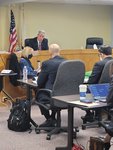Nearly all of Rhode Island buys electricity from a single source. That could change next year. A Pennsylvania-based power provider is in discussion to buy the Ocean State's primary electric service, the Narragansett Electric Company (NEC) ...
This item is available in full to subscribers.
We have recently launched a new and improved website. To continue reading, you will need to either log into your subscriber account, or purchase a new subscription.
If you are a current print subscriber, you can set up a free website account by clicking here.
Otherwise, click here to view your options for subscribing.
Please log in to continue |
|



Nearly all of Rhode Island buys electricity from a single source. That could change next year.
A Pennsylvania-based power provider is in discussion to buy the Ocean State’s primary electric service, the Narragansett Electric Company (NEC), from its current owner, National Grid. The parties have reached an agreement but several local advocacy groups and the Rhode Island Attorney General have refused to support the $5.3 billion sale. A final decision from the state’s Division of Public Utilities and Carriers is expected in February.
“This transaction is of particular importance to Rhode Island, because NEC provides electric distribution service to nearly all of the residents of the state (with some 510,000 customers), as well as being the primary natural gas distribution utility (with some 270,000 customers),” according to direct testimony and exhibits submitted by Mark D. Ewen and Robert D. Knecht, on behalf of the Office of Rhode Island Attorney General Peter F. Neronha.
Last week, the Allentown, Pennsylvania-based PPL Corporation argued that acquisition of NEC would benefit the public’s interest.
Several groups oppose the acquisition, and Neronha’s Office has warned the transaction may increase Ocean State electric bills.
“As such, the RIAG and other parties to this proceeding understandably desire, at a minimum, to ensure that the transaction will not have any negative impacts on ratepayers and the general public,” Ewen and Knecht testified.
Witnesses for PPL and the opposition delivered testimony before the Division of Public Utilities and Carriers, from Monday, Dec. 13, through Thursday, Dec. 16.
PPL Corporation and its family of companies provide “essential energy services to more than 2.5 million customers,” according to the company’s website.
“We provide an outstanding service experience for our customers, consistently ranking among the best utilities in the U.S.,” according to PPL. “As one of the largest regulated utility companies in the United States, we understand the electricity we provide is vital to our customers and communities. To that end, over the past decade, we have invested more than $20 billion in new infrastructure and technology in our U.S. operations to create a smarter, more reliable and resilient energy grid for generations to come.”
PPL received unanimous approval from the Federal Energy Regulatory Commission (FERC) to acquire NEC from National Grid USA in September 2021, according to a PPL press release.
“To date, PPL and National Grid have partnered to achieve four of the five regulatory approvals required for the transaction to proceed,” according to a PPL press release. “PPL remains focused on securing the final approval, which is required from the Rhode Island Division of Public Utilities and Carriers, and continues to expect that the transaction will be completed by March 2022.”
Although it’s not “cast in stone,” the target date for transaction approval or denial has been tentatively scheduled for Feb. 25, according to Thomas F. Kogut, Associate Administrator Cable TV/Legislative Liaison for the Division of Public Utilities and Carriers.
“We're pleased with FERC's decision, which puts us one step closer to concluding an acquisition we believe will drive significant value for Rhode Island families and businesses and strengthen PPL,” said Vincent Sorgi, PPL president and chief executive officer.
The proposed transaction involves the sale of NEC to PPL for $5.3 billion.
The NEC sale is the main component of a larger transaction, which includes an agreement by PPL to sells its UK Western Power Distribution (WPD) utility to National Grid.
If approved, NEC will become the sole subsidiary of a newly formed PPL Rhode Island Holdings, LLC, which will then become an indirect subsidiary to PPL.
“As we await final approval, we look forward to partnering with Narragansett Electric’s talented team to deliver energy safely, reliably and affordably to Rhode Island customers,” Sorgi said in a PPL press release. “We’re excited about the opportunity this acquisition presents for PPL to build one of the nation's most advanced grids, one that enables clean energy and supports the state’s ambitious decarbonization goals. And we look forward to partnering with local leaders to help strengthen Rhode Island communities.”
With the federal approval hurdle cleared, PPL and National Grid still have to convince state regulators.
Hearing Officer and Deputy Administrator of the Division of Public Utilities and Carriers John Spirito presided over the hearings last week.
Michael R. Ballaban, a Managing Consultant for Daymark Energy Advisors, specializes in pricing, cost-of-service, cost allocation, competitive market development, resource procurement and financial forecasting. He testified during the Division’s Advocacy Section.
“As I stated in my original testimony, evaluation of the public interest standard requires that I consider whether ratepayers will be held harmless from cost increases that would not have occurred but for the Transaction,” Ballaban stated in his surrebuttal testimony. “Given that Petitioners have not offered any commitments that demonstrate that customers will be insulated from the potentially substantial cost implications of this Transaction, cannot confirm that separation from National Grid does not negatively impact Narragansett’s retail revenue requirements, and consequently, customer rates. Therefore, I continue to recommend that the Petitioners’ Petition be rejected.”
Ewen and Knecht argue that a bigger owner may not necessarily translate into lower utility costs for Rhode Island residents. In their testimony, they note, “that larger utilities with centralized management and operations are not necessarily more cost-efficient than smaller utilities, as they can become bureaucratic and less responsive to local concerns.”
The Attorney General’s experts also have concerns regarding the transfer of National Grid/NEC employees, and a seamless service transition.
Since National Grid uses a “shared services” model for much of its customer service and administrative functions in the U.S. northeast, PPL will likely not inherit a complete workforce and management team, if the transaction is approved, according to Ewen and Knecht.
“This problem affects both basic operations and emergency storm response functions, as well as an assortment of customer service and administrative tasks,” they testified. “Based on our review of the discovery, it is unclear how long it will take PPL to make the transition, and it is especially unclear whether PPL will be able to do so without an overall increase in operating costs. While PPL made a belated effort to compare operating costs under PPL ownership compared to NG, the estimates remain uncertain. Because ratepayers are at risk for higher costs, these circumstances suggest that, if the transaction is approved, it is more important for the regulator to adopt ratepayer protections in this matter than in those that apply to other utility acquisitions.”
PPL has promised to “coordinate closely with National Grid on planning to ensure a seamless transition for Narragansett employees and customers upon regulatory approval and closing of the transaction,” according to a PPL press release.
On Tuesday, a spokeswoman for Neronha’s office promised the public that they would hear more on the issue from the state’s Attorney General.
“We remain significantly concerned about this matter,” said Kristy dosReis, Public Information Officer for the Rhode Island Office of the Attorney General. “We will be issuing a formal opinion in the coming weeks and will be able to comment further at that time!”
Comments
No comments on this item Please log in to comment by clicking here